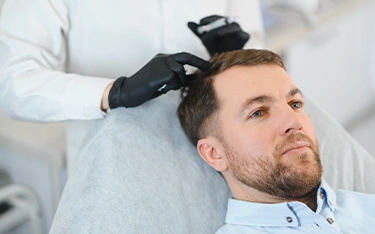Anagen Effluvium Treatments and Recovery
One of the biggest questions people have when dealing with anagen effluvium is, "Will my hair grow back?" The answer is yes. In most cases, the hair does grow back. Once the main cause behind hair fall has been identified and removed, the hair follicles usually start growing again. But how fast and how fully it grows back depends on a few factors.
-
Can hair grow back?
Hair regrowth is very common after anagen effluvium. This is more effective in cases where the causes, like chemotherapy or toxin exposure, are temporary. Most people begin to see new hair growth within a few weeks to months after treatment ends. The new hair might look or feel different at first, but it usually returns to normal over time.
-
Temporary vs permanent hair loss
Anagen effluvium is, in most cases, temporary. However, in rare cases, if the damage to the hair follicles is too severe, there are chances of a few areas not growing back fully. And that is one of the reasons that makes early care and treatment ideal.
-
Medications and supportive therapies
Doctors may suggest medications like minoxidil to encourage hair regrowth, although it's not always necessary. More importantly, managing the underlying cause, such as adjusting chemotherapy doses or stopping exposure to harmful chemicals, plays a key role in recovery.
-
Scalp cooling methods during chemotherapy
During chemo, some patients use scalp cooling caps. These help reduce blood flow to the scalp, which means fewer chemo drugs reach the hair follicles. While it doesn't guarantee complete hair protection, it has helped many reduce hair loss.
-
Nutritional and care tips for recovery
A healthy diet rich in protein, iron, and vitamins helps support hair regrowth. Avoid harsh hair products, heat styling, or tight hairstyles. Be gentle with your scalp, and give your body the rest it needs to heal.
With patience and the right anagen effluvium treatments, recovery is very much possible.
Also Read:
10 Ways of Treating Female Hair Loss
10 Best Ways to Stop Hair Loss in Dubai
Possible Alopecia Areata Triggers That Affect Men & Women
Preventive Measures and Coping Strategies
Dealing with anagen effluvium isn't just about hair loss; it's also about how it makes you feel. Losing hair suddenly can be upsetting, and while treatments focus on recovery, it's just as important to take care of your emotional well-being and learn how to manage it day by day.
- Scalp protection before and after treatment
If you know you're going to start chemotherapy or a treatment that may lead to anagen effluvium, you can take steps to protect your scalp. Some people use cold caps during chemo to reduce hair loss. After treatment, it's important to keep your scalp clean, moisturized, and shielded from the sun or cold weather. A soft hat or scarf can help keep it covered and comfortable.
- Wigs and cosmetic solutions
Wearing a wig, scarf, or cap is a simple and effective way to feel more like yourself. There are many lightweight, natural-looking wigs available that can match your style. Some people also use eyebrow pencils or false lashes if other hair is affected. These options don't fix the condition, but can help boost your confidence while your hair grows back.
- Psychological impact and support options
Hair loss can take a toll on your self-esteem. It's okay to feel sad or frustrated. Talking to a therapist or joining a support group can really help. Many people going through anagen effluvium find comfort in speaking with others who understand what they're facing.
Remember, anagen effluvium is usually temporary, and with the right care and anagen effluvium treatments, hair does grow back. But while you're on that journey, looking after your mind and emotions is just as important as taking care of your scalp.
Final Thoughts on Anagen Effluvium
If you or a loved one is going through sudden hair loss, it can feel overwhelming, especially when it happens so fast and without warning. But knowing what anagen effluvium is, what causes it, and how to manage it can make the experience easier to handle. Let's talk about what to expect during recovery and when to reach out for help.
The first thing to know is that anagen effluvium hair loss is usually temporary. Once the treatment or trigger is stopped, like chemotherapy or exposure to a harmful chemical, most people see their hair start to grow back in a few weeks or months. The new hair may feel softer, curlier, or even have a different color at first, but that often changes over time. Patience is key here. Your body needs time to heal, and so do your hair follicles.
- Importance of medical guidance
Even though it's a condition related to hair, anagen effluvium needs proper medical attention. Don't try to manage it on your own with random products or supplements. It's always best to speak to a dermatologist or a medical professional who understands the underlying anagen effluvium cause. They can help you figure out whether you need medication, supportive therapies, or just time and care. They may also look at your overall health to check for any hidden triggers.
- When to seek professional help
If your hair loss feels too fast, too severe, or doesn't stop even after treatment ends, don't wait; reach out to a professional. It could be that another condition is involved or that your body needs extra support. Also, if you're feeling emotionally affected by the hair loss, talking to a counsellor can be just as important as physical care. Your mental and emotional health matter just as much.





